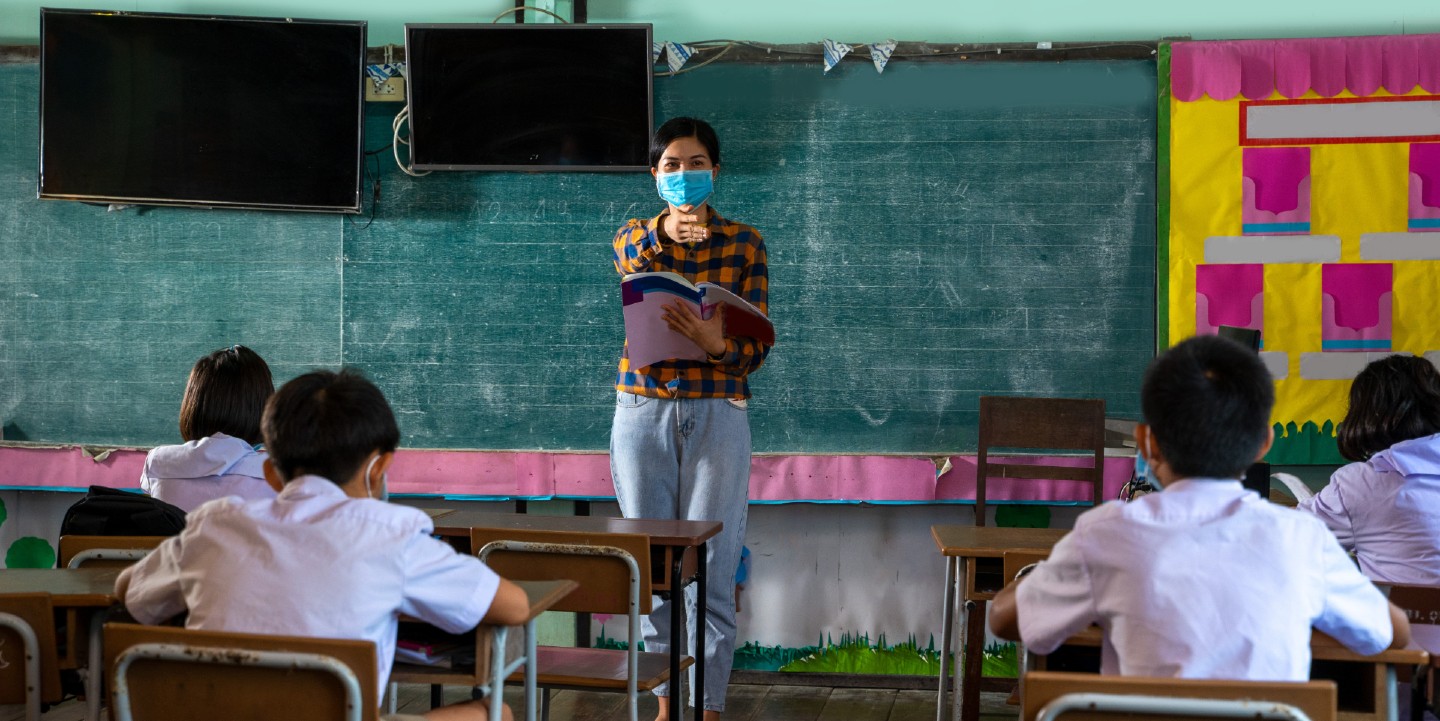
Support for teachers key to improving literacy during COVID-19 and beyond
Feature 8 Sep 2020 7 minute readThis International Literacy Day, we highlight how direct support for teachers can improve the foundational skills of children in low and middle income countries during COVID-19 and beyond.
The COVID-19 crisis has disrupted learning for children around the world. During the initial phase of the pandemic, school closures interrupted the education of 62.3 per cent of the world’s 1.09 billion student population. And now, the substantial inequalities that existed across and within education systems around the world before COVID-19 are becoming more prominent.
The disruption to schooling has impacted student learning in different ways and to varying degrees. With adequate resources, parental support at home and trained teachers, some students have had the opportunity to continue their learning throughout the pandemic. The effect on these students may be minimal. However, there is likely to be a greater impact for students with limited access to quality learning opportunities during the pandemic.
As millions of children return to school, support for wide scale system restarts is needed. In severely disadvantaged communities, the focus must be on learning and accelerating students' acquisition of early foundational skills such as literacy and numeracy.
As systems begin to restart, it is critical for teachers to support the missed learning of their students and to reliably determine and target teaching to their individual levels of development. This involves identifying the current level of development of their students – what they know and can do right now – and also the next logical step for learning.
Growth is more likely when teaching is targeted to the point of need and follows the ‘Goldilocks principle’, whereby teachers focus on material that is not too easy or too hard, but ‘just right’. Without the ability to properly target teaching and learning, time may be lost and learning opportunities wasted if students are faced with learning experiences that are either too easy for any new learning to occur, or too difficult to allow any meaningful access into learning.
Internationally, there has been considerable progress made to identify and describe the foundational skills that underpin the development of successful learners. The UNESCO led Global Alliance to Monitor Learning (GAML), to which the Australian Council for Educational Research (ACER) is a lead technical adviser, has developed a set of global indicators to monitor and report on learning that transcends curricula and national systems. These indicators provide all countries committed to the United Nations Sustainable Development Goals with a common set of Minimum Proficiency Levels to report progress of student learning outcomes.
Teachers must be able to identify the knowledge and skill of a student when they see it and to facilitate it when it is not yet visible. Yet the capacity of teachers to appropriately measure where students are in their learning trajectory and then support foundational literacy skills of students is of continuing concern. This is especially true in low and middle income countries where teachers may not have access to adequate professional learning opportunities. As a result of COVID-19, many teachers will require additional support to meet the needs of children whose learning has been disrupted.
The pandemic presents an opportunity to provide direct support to teachers and to equip them with a practical suite of simple and universally relevant tools, guides, applications and mechanisms of classroom-based support. It is important that these materials are grounded in evidence, support a pedagogy that positions children as actively engaged, agentic and capable learners, and aim for learning to be a positive and rewarding experience.
Materials might take the form of simple ‘toolkits’ that provide teachers with easily accessible and actionable information to support different foundations for learning. Ideally, these toolkits would include a description, easily observable indicators, and ideas for teaching and learning foundational literacy skills. The toolkits could include prompts to support teachers to engage with the ideas, adapt them to fit their context, implement suggested strategies and reflect on the experience.
A holistic view of learning that is concerned with the social, emotional, cognitive and physical development and creativity of students is also needed. Teachers must consider the possible impact of COVID-19 on the social-emotional development and wellbeing of their students, as they may present additional barriers to learning. As school returns, teachers could integrate literacy development with opportunities to improve social skills, emotional awareness and regulation, and foster a sense of wellbeing in their students. For example, teachers could provide opportunities for rich discussions about experiences, feelings and concerns, and encourage students to share their ideas about re-engaging with school.
Building children’s early foundational literacy skills and improving teaching and learning is not new to the COVID-19 pandemic or to ACER. Working alongside governments and international agencies, ACER uses evidence to design policies and systems to enhance teaching and learning professional practice and support teachers to understand and improve what is happening in their classrooms.
What is needed as part of a targeted COVID-19 response is to systematically support teachers to rapidly assess children once they return to school, translate their learning needs into a practical suite of materials for classroom-based teaching, and to align these to the global standards of student proficiency as defined by GAML. A critical factor in improving literacy skills during COVID-19 and beyond will be to ensure that initiatives are flexible and adaptable, and that they link to a wider common global framework of student development.
With investment from policymakers and development partners around the world, targeted COVID-19 initiatives have the potential to significantly improve the immediate and long term literacy of children in low and middle income countries.
Further reading
Read about ACER’s work and partners in the education and development sector.
Learn how ACER supports the monitoring of educational outcomes worldwide through the Centre for Global Education Monitoring.
